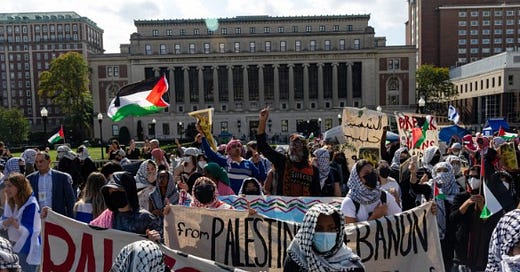Veterans Day Protests Erupted at Columbia and Harvard
But counterprotests demonstrated the self-correcting nature of unfettered free speech
Veterans Day would seem like the most anodyne, widely-embraced, noncontroversial of federal holidays, even in these contentious times. But that’s just not so on certain college campuses, where disdain for everything American now apparently extends to any Americans who served in uniform.
The vast majority of American college students celebrated Veterans Day as most of us do, by enjoying some time off and taking a moment to remember, honor, or thank friends, colleagues, or family members who served. But the holiday didn’t pass without controversy at Columbia University and Harvard, in another indicator of how far out of the mainstream certain schools are.
At Columbia, a group calling itself “Columbia University Apartheid Divest” rebranded Veterans Day as "Martyrs Day," to protest the "Israel-US war machine.”
The group’s statement read in part:
"Veterans Day is an American holiday to honor the patriotism, love of country, and sacrifice of veterans. We reject this holiday and refuse to celebrate it. The American war machine should not be honored for the horrors unleashed on others. Instead, we will celebrate Martyrs Day in honor of those martyred by the Israel-US war machine. A day to honor the patriotism, love of country, and sacrifice of those martyrs."
Here’s how the “Martyrs Day” celebration was covered by The New York Post.
But here’s the interesting part. This demonstration of disrespect didn’t go unanswered, as Fox News reported, showing that the best defense against offensive speech isn’t censorship, shout-downs, or fists but more free speech.
A group called Military Veterans of Columbia University posted on Facebook that it was planning a Veterans Day celebration for Monday around the corner from campus.
Campus veterans also intend to celebrate the holiday at the same time in opposition to the Columbia University Apartheid Divest, students told the New York Post. One said that after protesters' celebration of Hamas' Oct. 7 attacks in Israel – much of which was directed at on-campus veterans – the group's Veterans Day plans added insult to injury.
"That post really shook the hornet’s nest," Sam Nahins, a 31-year-old Air Force veteran and Columbia graduate student who completed his undergraduate degree at the school in the spring, told the Post of the group's online posts about their Veterans Day plans.
"They’ve never hid their disdain for veterans. But now it’s really out in the open," he added. "Last year when students and faculty members were running around dressing up as jihadists and screaming ‘Death to America,’ ‘Death to Western civilization,’ death to everything but their cause, I had friends get called infidels, and murderers and baby-killers."
And Columbia, to its credit, issued a statement in support of the 700 veterans enrolled there, which read in part:
“Columbia is proud of our students, faculty and staff who are veterans, and we are grateful for their service and sacrifice and the invaluable contributions they offer to our community. The University honors its veterans on Veterans Day and every day, and we are proud to be participating in the New York Veterans Day Parade, as we have for more than a decade.”
More coverage of the counteroffensive by veterans and their supporters can be found here.
Meanwhile, at Harvard, the school took a different approach to dissing veterans, by holding classes rather than canceling them, which prompted this response in The Harvard Crimson.
Harvard has a deep historical connection to the U.S. military. Its alumni include 18 Medal of Honor recipients, the most of any university besides West Point and the Naval Academy. Memorial Hall, one of Harvard’s flagship buildings, is dedicated to the Harvard alumni who died fighting for the Union in the American Civil War. Harvard’s peace rests on the sacrifices veterans have made.
And yet, Harvard refused to celebrate Veterans Day — a choice indicative of its general failure to address issues facing veterans on campus.
Harvard’s indifference toward veterans is ironic, given that it claims the most Medal of Honor recipients of any school in America, excluding our military academies. No one may have taken notice this Veterans Day, sadly, but Harvard’s Memorial Hall lists the names of 136 alumni who died while serving in the Army or Navy during the Civil War — sacrifices that go unappreciated there today.
Disrespecting veterans is a constitutionally protected form of free expression. I may not like it, but I’m not calling for the punishment or censorship of those who organized “Martyr’s Day” or held class in defiance of holiday norms. Instead, I’m seeing silver linings in the fact that these protests didn’t go unanswered (something Samuel J. Abrams also noted in this Minding the Campus piece).
Others on campus used their free speech rights to voice support for veterans. Others on campus used their free speech rights to critique those who feel such disdain for America (or her foreign policy) that they can’t even recognize the merit of military service. And that’s the way this should work, producing a robust back and forth, allowing the rest of us to decide who’s reasonable and who’s radical.
There are other ways unfettered free speech can be self-correcting. Given such controversies, it’s not hard to see why donations to Harvard and Columbia are in free fall right now. Giving or withholding donations is another time-honored way to exercise First Amendment rights. And disenchanted donors are sending both schools loud-and-clear messages of displeasure over the radical climate that has taken root on campus. The donor rebellion is also a form of protest. And Columbia and Harvard can choose to ignore those protesters at their peril.




